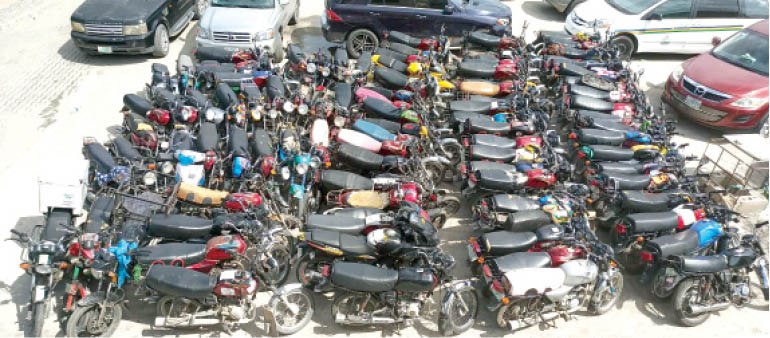Okada ban and superficial solutions
If there is one thing which more than anything exemplifies the shallow thought processes prevalent in state governance these days, it’s the problem of commercial motorcyclists known as “Okada” riders. Superficial thought processes are the root causes of both the problem and the inappropriate solutions being adopted. The use of motorcycles to carry fee-paying passengers […]

If there is one thing which more than anything exemplifies the shallow thought processes prevalent in state governance these days, it’s the problem of commercial motorcyclists known as “Okada” riders. Superficial thought processes are the root causes of both the problem and the inappropriate solutions being adopted.
The use of motorcycles to carry fee-paying passengers satisfies a demand created by the failure of successive governments to develop effective public transport systems. Initially Okada riders lived and worked within their community, had local knowledge, and were known by residents to the extent that families commissioned them to carry their children to and from school daily. Visitors to a city or town only had to ask Okada riders for correct directions to any destination. As time went by, economic downturn, high unemployment levels and lack of job prospects increased the number of Okada riders, who now include both the uneducated and unemployed graduates. The number was drastically increased by a massive influx from citizens moving away from war-torn poverty ridden northern states to safer more prosperous ones in the South. They were joined by riders from relatively peaceful prosperous northern cities such as Kano, Katsina and Kaduna, who for security reasons had banned the Okada riders. Major towns and cities in the South witnessed a massive influx of non-indigenes motorcycles’ operators.
The failure of state governments to regulate operations of Okada riders turned the “profession” into an all comers affair. This signalled the beginning of the end for the unregulated “business” as criminals took advantage and used motorcycles to perpetrate crimes. From its good beginnings Okada riders are now regarded as strangers who mostly don’t speak English and never familiarise themselves with local customs. Now the supply of migrating riders has exceeded demand. Armed with only their motorcycles they don’t possess the financial wherewithal to rent accommodation, and are in effect Internally Displaced Persons (IDP’s) living in shanties. Their poor education and survival instincts led them to disrespect traffic laws, be violent at the slightest provocation and a law unto themselves. The trouble makers amongst them engage in criminality, incite mob actions, execute jungle justice, maim and kill. Such behaviour has brought negative consequences, the most unfortunate of which is all Okada riders are now unjustifiably being tarred with the same brush of lawlessness.
This is at the core of their recurring problems with local youths and authorities. The blame for these problems lies squarely at the feet of the governors. In days gone by they always sought for lasting solutions to problems. These days they are no longer inclined towards doing things properly and are fond of superficial “palliative measures” which only shift problems forward to another day.
When faced with the problem of a large uneducated populace with no marketable employment skills, some northern governors made a disingenuous attempt to cover up the repercussions of their failure to enforce compulsory basic education and acquisition of technical skills. They implemented an emergency palliatives of ill-considered “empowerment programmes”. With great fanfare they handed out motorcycles, grinding machines, shoe repair boxes and even tea making equipment which in reality only empowered recipients to remain poor! The opportunities for Okada riding are reducing daily because an increasing number of states are banning Okada riders within city limits.
Lagos State government recently enforced the ban by forcibly seizing and destroying thousands of motorcycles. Questions have rightly been asked as to whether it has any legal or moral justification to seize and destroy personal property and deprive citizens of their means of livelihood. The welfare of these economically disadvantaged citizens seems not to bother state governments because they are considered as non-indigenes.
Lagos State’s already precarious security situation has been made worse by this mass unemployment without compensation at short notice of only four days. Questions are rightly being asked as to why authorities could not be patient enough to enact laws under which motorcycles are not destroyed, the owners are compensated, and the machines given to the Army or Police to enhance their operational capabilities. The state government acted with little consideration of the consequences for the general public as the ban led to an increase in transportation costs, increased hardship, and lowered the already falling standards of living in the state.
Although it’s self-evident that simply flooding the streets with motorcycles isn’t an appropriate means of solving problems of mass transportation or mass unemployment, state governments must wake up to their responsibilities and not exacerbate problems.
A holistic lasting solution to problems of criminality, mass transit and mass unemployment involves far more than a myopic ban on Okada riders. A good start lays in establishing skills acquisition centres to develop necessary manpower and investing in the development of proper mass transit transportation systems, facilities and infrastructure to create opportunities for mass employment.
The real problem is that appropriate holistic solutions involve the sort of deep “outside the box” thinking, rigorous contemplation, research, and proper execution which unfortunately Nigerian public office holders are not known for, and do not excel at. Many new governors are set to emerge next year. They must bring fresh ideas and holistic well-considered transportation policies to replace the superficial solutions which have only served to exacerbate problems.
